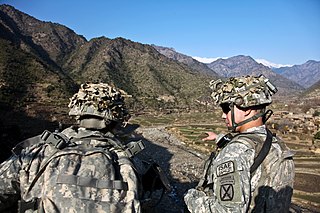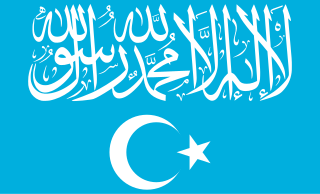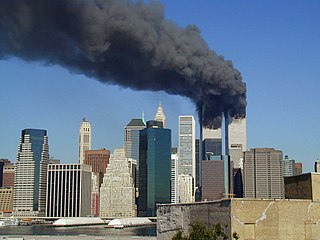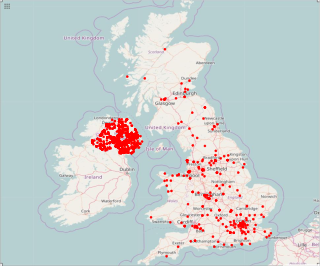Related Research Articles

Al-Qaeda, officially known as Qaedat al-Jihad, is a multinational militant Sunni Islamic extremist network composed of Salafist jihadists. Its members are mostly composed of Arabs, but may also include other peoples. Al-Qaeda has mounted attacks on civilian and military targets in various countries, including the 1998 United States embassy bombings, the September 11 attacks, and the 2002 Bali bombings; it has been designated as a terrorist group by the United Nations Security Council, the North Atlantic Treaty Organization (NATO), the European Union, India, and various other countries.

Operation Enduring Freedom (OEF) was the official name used synonymously by the U.S. government for both the War in Afghanistan (2001–2014) and the larger-scale Global War on Terrorism. On 7 October 2001, in response to the September 11 attacks, President George W. Bush announced that airstrikes targeting Al-Qaeda and the Taliban had begun in Afghanistan. Operation Enduring Freedom primarily refers to the War in Afghanistan, but it was also affiliated with counterterrorism operations in other countries, such as OEF-Philippines and OEF-Trans Sahara.

The Turkistan Islamic Party (TIP) or the Turkistan Islamic Movement (TIM), formerly known as the East Turkestan Islamic Movement (ETIM) and other names, is an Uyghur Islamic extremist organization founded in Western China. Its stated goals are to establish an independent state called East Turkestan replacing Xinjiang. The UN Security Council Al-Qaeda Sanctions Committee has listed ETIM as a terrorist organization since 2002. The United States removed it from its list of Terrorist Organizations in 2020, claiming it ceased to exist.

Islamic terrorism refers to terrorist acts with religious motivations carried out by fundamentalist militant Islamists and Islamic extremists.

United Nations Security Council Resolution 1373, adopted unanimously on 28 September 2001, is a counterterrorism measure passed following the 11 September terrorist attacks on the United States. The resolution was adopted under Chapter VII of the United Nations Charter, and is therefore binding on all UN member states.

Harkat-ul-Jihad-al-Islami is a Pakistani Islamic fundamentalist Jihadist organisation affiliated with Al-Qaeda and Taliban.

Islamic extremism, Islamist extremism, or radical Islam, is used in reference to extremist beliefs and behaviors which are associated with the Islamic religion. These are controversial terms with varying definitions, ranging from academic understandings to the idea that all ideologies other than Islam have failed and are inferior to Islam. These terms can also be used in reference to other sects of Islam that do not share such beliefs. Political definitions of Islamic extremism include the one which is used by the government of the United Kingdom, which understands Islamic extremism as any form of Islam that opposes "democracy, the rule of law, individual liberty and mutual respect and tolerance of different faiths and beliefs". In 2019, the U.S. Institute for Peace released an important report on extremism in fragile states that developed recommendations focused on adopting a shared understanding, operationalize a prevention framework, and rallying the international community.

The Islamic State (IS), also known as the Islamic State of Iraq and the Levant, Islamic State of Iraq and Syria, and by its Arabic acronym Daesh, is a militant Islamist group and former unrecognized quasi-state that follows the Salafi jihadist branch of Sunni Islam. It was founded by Abu Musab al-Zarqawi in 1999 and gained global prominence in 2014, when it drove Iraqi security forces out of key cities during the Anbar campaign, which was followed by its capture of Mosul and the Sinjar massacre.
The threat of terrorism in Kazakhstan plays an increasingly important role in relations with the United States which in 2006 were at an all-time high. Kazakhstan has taken Uzbekistan's place as the favored partner in Central Asia for both Russia and the United States. Kazakhstan's counter-terrorism efforts resulted in the country's 94th ranking among 130 countries in the 2016 Global Terrorism Index published by the Institute of Economics and Peace. The higher the position on the ranking is, the bigger the impact of terrorism in the country. Kazakhstan's 94th place puts it in a group of countries with the lowest impact of terrorism.
Radicalization is the process by which an individual or a group comes to adopt increasingly radical views in opposition to a political, social, or religious status quo. The ideas of society at large shape the outcomes of radicalization; for example, radical movements can originate from a broad social consensus against progressive changes in society or from a broad desire for change in society. Radicalization can result in both violent and nonviolent action – academic literature focuses on radicalization into violent extremism (RVE) or radicalisation leading to acts of terrorism. Multiple separate pathways can promote the process of radicalization, which can be independent but are usually mutually reinforcing.

The war on terror, officially the Global War on Terrorism (GWOT), is an ongoing international counterterrorism military campaign initiated by the United States following the September 11 attacks. The main targets of the campaign are militant Islamist and Salafi-Jihadist armed organisations such as Al-Qaeda, the Islamic State and their international affiliates; which are waging military insurgencies to overthrow governments of various Muslim countries.

Terrorism in the United Kingdom, according to the Home Office, poses a significant threat to the state. There have been various causes of terrorism in the UK. Before the 2000s, most attacks were linked to the Northern Ireland conflict. In the late 20th century there were also attacks by Islamic terrorist groups.

United Nations Security Council resolution 1455, adopted unanimously on 17 January 2003, after recalling resolutions 1267 (1999), 1333 (2000), 1363 (2001), 1373 (2001), 1390 (2001) and 1452 (2002) concerning Al-Qaeda, the Taliban and terrorism, the council improved the implementation of measures against the groups. It was the first Security Council resolution adopted in 2003.

United Nations Security Council resolution 1617, adopted unanimously on 29 July 2005, after recalling resolutions 1267 (1999), 1333 (2000), 1363 (2001), 1373 (2001), 1390 (2001), 1452 (2002), 1455 (2003), 1526 (2004) and 1566 (2004) concerning terrorism, the Council renewed sanctions against Al-Qaeda, the Taliban, Osama bin Laden and associated individuals and groups for a further seventeen months.
Jihadist extremism in the United States refers to Islamic extremism occurring within the United States. Islamic extremism is an adherence to a fundamentalist interpretation of Islam, potentially including the promotion of violence to achieve political goals. In the aftermath of the September 11, 2001 terror attacks, Islamic extremism became a prioritized national security concern of the United States government and a focus of many subsidiary security and law enforcement entities. Initially, the focus of concern was on foreign terrorist groups, particularly Al-Qaeda, but in the course of the years since the September 11th attacks, the focus has shifted more towards Islamic extremism within the United States. Although the number of American citizens or long-term residents involved in extremist activity is small, it is a national security concern.
The International Centre for Counter-Terrorism (ICCT) is an independent think tank providing multidisciplinary policy advice and practical support focused on prevention and the rule of law, two important parts of effective counter-terrorism work. ICCT's work focuses on themes at the intersection of countering violent extremism and criminal justice sector responses, as well as human rights related aspects of counter-terrorism. The major project areas concern countering violent extremism, rule of law, foreign fighters, country and regional analysis, rehabilitation, civil society engagement and victims' voices.

Al-Qaeda in the Indian Subcontinent usually abbreviated as AQIS, is an Islamist militant organization which aims to fight the governments of Pakistan, Afghanistan, India, Myanmar and Bangladesh in order to establish an Islamic state.

Siege is an anthology of essays first published as a single volume in 1992, written in 1980s by James Mason, a neo-Nazi and associate of the serial killer Charles Manson. After growing disillusioned with the mass movement approach of neo-Nazi movements, he began advocating for white revolution through terrorism. Referred to as the "Godfather of Fascist Terrorism", Mason has been proscribed as a "terrorist entity" in Canada.” Mason originally wrote the essays for the eponymous newsletter of the National Socialist Liberation Front, a militant splinter of the American Nazi Party.

An End to al-Qaeda: Destroying Bin Laden's Jihad and Restoring America's Honor is a non-fiction book about counterterrorism strategies towards al-Qaeda, written by U.S. Navy retired cryptology analyst Malcolm Nance. The book describes how the September 11 attacks changed the traditional Muslim community around the globe. Nance criticizes the approach of the George W. Bush administration, including the verbiage and public presentations used in the War on Terror. The author argues al-Qaeda is not part of Islam but is instead a dangerous religious cult. Nance writes the United States should commit to better education with a public relations campaign to encourage traditional believers in Islam around the world to denounce al-Qaeda.

Terrorist Recognition Handbook: A Practitioner's Manual for Predicting and Identifying Terrorist Activities is a non-fiction book about counterterrorism strategies, written by U.S. Navy retired cryptology analyst Malcolm Nance. The book is intended to help law enforcement and intelligence officials with the professional practice of behavior analysis and criminal psychology of anticipating potential terrorists before they commit criminal acts. Nance draws from the field of traditional criminal analysis to posit that detecting domestic criminals is similar to determining which individuals are likely to commit acts of terrorism. The book provides resources for the law enforcement official including descriptions of devices used for possible bombs, a database of terrorist networks, and a list of references used. Nance gives the reader background on Al-Qaeda tactics, clandestine cell systems and sleeper agents, and terrorist communication methods.
References
- 1 2 3 4 "Barrett, Richard Martin Donne, (born 14 June 1949), counter-terrorism and violent extremism consultant; pundit; Director, Global Strategy Network, since 2016; Adjunct Professor of Law, Case Western Reserve University, Ohio, since 2014". WHO'S WHO & WHO WAS WHO. doi:10.1093/ww/9780199540884.013.u259774. ISBN 978-0-19-954088-4 . Retrieved 22 May 2021.
- ↑ "The Al-Qaida Sanctions Committee". Archived from the original on 24 August 2011. Retrieved 7 January 2011.
- ↑ "United Nations - Alliance of Civilizations - Rapid Response Media Mechanism". Archived from the original on 26 January 2011. Retrieved 26 March 2011.
- ↑ "CNN". CNN. Retrieved 26 November 2014.
- ↑ "Charlie Rose". Charlierose.com. Archived from the original on 3 April 2013. Retrieved 26 November 2014.
- ↑ Richard Barrett. "Taliban put to the test". The Guardian. Retrieved 26 November 2014.
- ↑ "Time to Talk to the Taliban". The New York Times . Retrieved 7 July 2016.
- ↑ "Why the Afghan end-game is so hard to play". Financial Times. Retrieved 26 November 2014.
- ↑ "Terrorism and counterterrorism". The New York Times . Retrieved 7 July 2016.
- ↑ "Richard Barrett". Global Experts. Retrieved 7 July 2016.
- ↑ "ICCT :: International Centre for Counter-Terrorism - the Hague". Archived from the original on 18 August 2011. Retrieved 26 March 2011.
- ↑ "Center on Global Counterterrorism Cooperation". Archived from the original on 10 May 2011. Retrieved 26 March 2011.
- ↑ "Management « CRSS – Center for Research and Security Studies – Islamabad, Pakistan". Archived from the original on 1 March 2014. Retrieved 1 March 2014.
- ↑ "QIASS – Qatar International Academy for Security Studies". Qiass.org. Retrieved 26 November 2014.
- ↑ "Global Training in the Rule of Law". Sunsglow.com. Retrieved 7 July 2016.
- ↑ "London Gazette Issue 53153, Supplement (30 December 1992)". The London Gazette . 17. Retrieved 7 July 2016.
- ↑ "No. 60534". The London Gazette (Supplement). 15 June 2013. p. 3.
- ↑ telegraph.co.uk: "New al-Qaeda 'body bombs' that can beat airport security are alarming terror experts", 3 October 2009
- ↑ theguardian.com: "Disillusioned British militants have role to play in fight against Isis", 6 September 2014
- ↑ telegraph.co.uk: "", 15 November 2015
- ↑ theguardian.com: "We can’t expect Facebook to stop terrorists", 26 November 2014
- ↑ theguardian.com: "Lee Rigby murder: Facebook could have picked up killer’s message – report", 26 November 2014
- ↑ theguardian.com: "Theresa May’s ‘enough is enough’ risks making the extremist threat worse", 5 June 2017
- ↑ telegraph.co.uk: "The best defence against terrorism is to show that it does not work as a way of changing government policy or public perception", 16 July 2016
- ↑ telegraph.co.uk: "We have the world's best security services – but the Manchester attack was inevitable", 23 May 2017